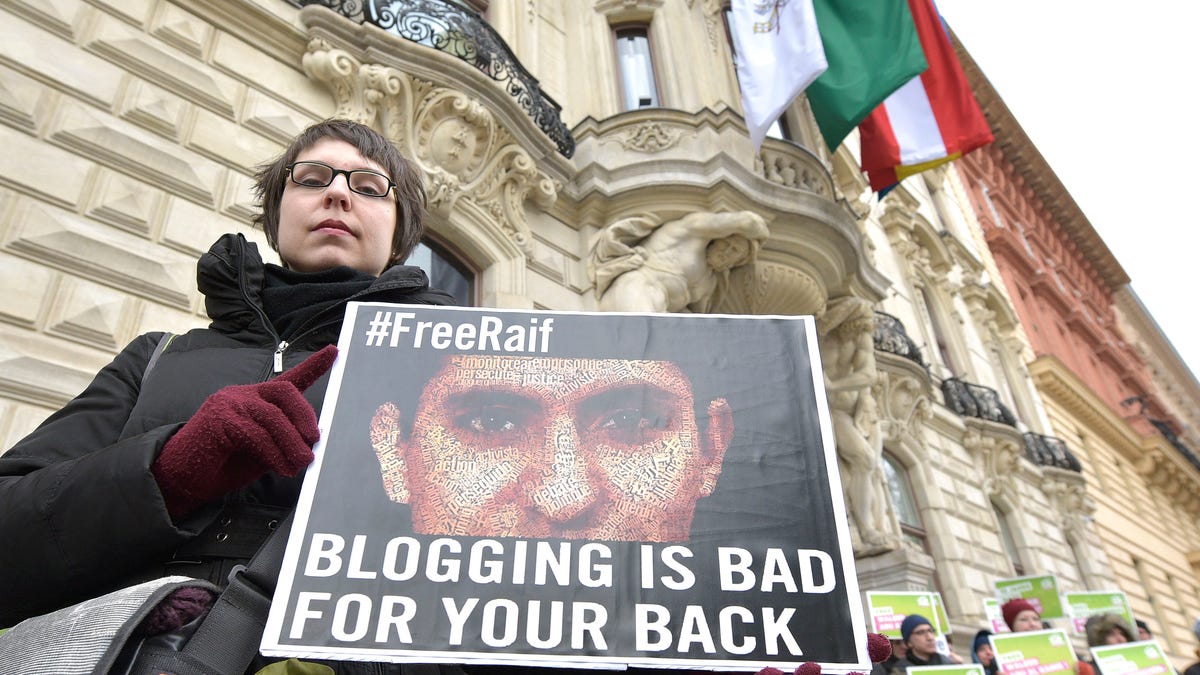
Feb. 6, 2015 - FILE photo of Austrian Greens protesting the punishment for Saudi blogger Raif Badawi in Vienna, Austria. Badawi's wife says a second round of lashes has been delayed. He's been in prison since 2012 for what the Kingdom calls “insulting Islam.”
A second round of lashes has been delayed for Saudi blogger Raif Badawi-- jailed for what the Kingdom calls “insulting Islam”-- his wife said via Twitter Friday.
Badawi’s wife, Ensaf Haidar, announced the postponement on his feed Friday. "No flogging for today," Haidar wrote on her husband's Twitter account. "I repeat my appeal to his majesty King Salman to pardon my husband #RaifBadawi and stop his flogging."
Badawi, 31, was arrested and imprisoned in June 2012 and a Saudi court initially sentenced him to seven years in prison and 600 lashes for breaking Saudi Arabia's technology laws and insulting Islamic religious figures through a blog that he created. One of his posts criticized the Saudi clergy and called for changes in the way religion is practiced in Saudi Arabia.
After a 2013 appeal, a criminal court stiffened the punishment to ten years in prison, 1,000 lashes, and a $266,000 fine. He was also banned from traveling abroad ten years after his prison term.
Despite international outcry for Badawi’s release, the Saudi Supreme Court recently upheld the sentence and it can only be overturned by a royal pardon. The Kingdom has not shown any indication of changing the blogger’s fate, and there was no explanation for Friday’s delay.
Amnesty International, which has forged a campaign to free Badawi since his sentence also Tweeted a message about him Friday. “We can confirm Raif Badawi has NOT been flogged today in Saudi Arabia. He must be released immediately & unconditionally #FreeRaif,” the AmnestyOnline account said.
Badawi was to receive 50 lashes a week in a public square outside a mosque in Jeddah for 20 weeks. He received the first 50 in January but there have been no further lashings, due to medical concerns.
The United Nations, U.S., European Union, Canada and other countries have condemned the verdict. But Saudi Arabia has dismissed criticism of the case, calling it a media campaign, The Guardian reported Thursday.
The Quebec government will accelerate immigration procedures for Badawi, Quebec Immigration Minister Kathleen Weil told reporters Friday.
The province will offer Badawi an immigration selection certificate on humanitarian grounds, which would speed up the process to allow him to reunite with his family in Quebec, the Canadian Press reported.
Badawi is not a Canadian citizen, but his wife and three children fled Saudi Arabia in 2012 and are now living in Quebec.
In 2008, Badawi co-founded the Saudi Liberal Network, an online discussion group that encouraged debate over religious and political issues.
“All this cruel suffering happened to me because I expressed my opinion,” Badawi reportedly wrote in a letter from prison, published by the German news magazine Der Spiegel in March.
Saudi Arabia has been widely criticized for its human rights record, including its laws on political and religious expression and the status of Saudi women. Public worship of faiths other than Islam is not permitted. In a new law last year it included atheism as a terrorist offense.
In March, the Kingdom defended its record in a statement carried on state media and attributed to an unnamed "foreign ministry official," Reuters reported.
"Saudi Arabia expresses its intense surprise and dismay at what is being reported by some media about the case of citizen Raif Badawi and his sentence," the statement read.
The statement also said Saudi courts were independent and the kingdom's constitution ensured the protection of human rights because it was based on Islamic Sharia law.
"Saudi Arabia at the same time emphasizes that it does not accept interference in any form in its internal affairs," the statement added.
The kingdom has beheaded 40 people in 2015, Amnesty has said, based on local media reports. Political dissidents have been given long jail terms in the past year after repeatedly raising human rights issues in international media and asking the absolute monarchy to introduce elections.
The kingdom is the only country in which women are forbidden to drive. Saudi women also require the permission of a male guardian, usually a close family member, to conduct many aspects of official business, including overseas travel.
The Associated Press contributed to this report.
